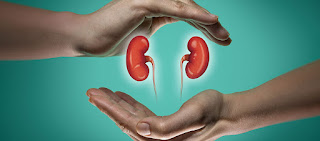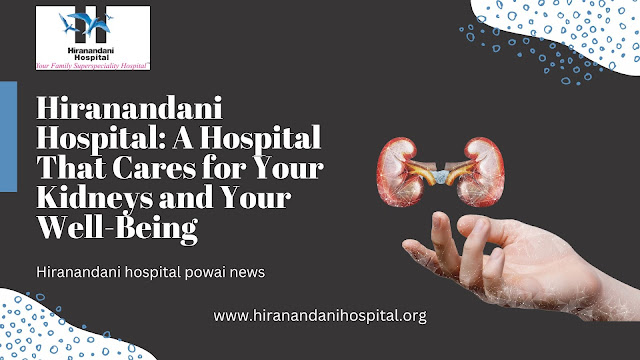Understanding the Role of the Kidneys in Maintaining Overall Health
The kidneys are two bean-shaped organs located in the lower
back and play a crucial role in maintaining overall health. These remarkable
organs perform several vital functions that contribute to the body's
well-being. In this blog, we will delve into the importance of the kidneys and
how they ensure our bodies function optimally. We will also explore the
expertise of Dr. Sujit Chatterjee, the CEO of Hiranandani Hospital, renowned
for its exceptional kidney transplant program.
Regulation of Fluid Balance: The kidneys maintain the
body's fluid balance by adjusting the amount of water excreted through urine.
They retain water when the body is dehydrated and eliminate excess water when
necessary. This delicate balance is crucial for maintaining optimal blood
pressure and preventing conditions such as edema.
Electrolyte Balance: Kidneys regulate the levels of
essential electrolytes such as sodium, potassium, calcium, and phosphate in the
body. These electrolytes are vital for proper nerve and muscle function,
maintaining the body's pH balance, and ensuring overall cellular health.
Acid-Base Balance: Kidneys play a key role in
maintaining the body's acid-base balance. They remove excess acids produced
during metabolic processes and help regulate the pH levels of the blood. This
balance is crucial for the proper functioning of enzymes and other biochemical
processes in the body.
Red Blood Cell Production: The kidneys produce a
hormone called erythropoietin, which stimulates the production of red blood
cells in the bone marrow. Red blood cells are responsible for carrying oxygen
to various parts of the body. Adequate erythropoietin production by the kidneys
ensures the body receives enough oxygen for optimal functioning.
Dr. Sujit Chatterjee CEO, of Hiranandani Hospital kidney
transplant, is dedicatedly working on bringing the best facilities and
quality care related to kidney diseases and kidney failure in the department.
Their good work is carried with concern, and respect for every patient which is
the support system of this entire hospital. Hiranandani Powai
Hospital boasts a state-of-the-art kidney transplant program, offering
advanced diagnostic techniques and comprehensive care for patients with kidney
diseases. It also provides safe
treatment with fully equipped endoscopic and laparoscopic surgeries.
Under Dr. Sujit Chatterjee's leadership, Hiranandani
Hospital has successfully performed numerous kidney transplant surgeries,
giving patients a new lease on life. The hospital provides a multidisciplinary
approach to kidney transplantation, involving a team of experienced surgeons,
nephrologists, and support staff who work together to ensure optimal patient
outcomes.
Prevention and Maintenance of Kidney Health:
Maintaining healthy kidneys is crucial for overall
well-being. Here are some preventive measures and lifestyle choices that can
help promote kidney health:
Stay Hydrated: Drinking an adequate amount of water
helps ensure proper kidney function. It helps in the filtration process and
prevents the formation of kidney stones. Aim to drink at least 8 glasses of
water per day, or as per your doctor's recommendation.
Follow a Balanced Diet: A diet rich in fruits,
vegetables, whole grains, and lean proteins supports kidney health. Limit the
intake of processed foods, high-sodium foods, and sugary beverages.
Additionally, reduce the consumption of alcohol and caffeine, as they can
strain the kidneys.
Manage Blood Pressure and Blood Sugar Levels: High
blood pressure and uncontrolled diabetes can damage the kidneys over time. It
is essential to monitor and manage these conditions through regular check-ups,
medication, and lifestyle modifications to protect kidney health.
Maintain a Healthy Weight: Obesity increases the risk
of developing kidney diseases. Engage in regular physical activity and maintain
a healthy weight to reduce the strain on your kidneys.
Avoid Smoking: Smoking damages blood vessels and reduces
blood flow to the kidneys, increasing the risk of kidney disease. Quitting
smoking not only benefits your kidneys but also improves your overall health.
Limit Over-the-Counter Medications: Overuse or misuse
of non-prescription pain relievers, such as nonsteroidal anti-inflammatory
drugs (NSAIDs), can harm the kidneys. Always follow the recommended dosage and
consult a healthcare professional if you have any concerns.
Regular Exercise: Engaging in regular physical
activity helps maintain healthy blood pressure, improves cardiovascular health,
and enhances overall well-being. Choose activities you enjoy, such as walking,
swimming, or cycling, and aim for at least 30 minutes of exercise most days of
the week.
Conclusion:
Understanding the crucial role of the kidneys in maintaining
overall health empowers us to prioritize their well-being. We can ensure
optimal kidney function and prevent kidney diseases by following a healthy
lifestyle, seeking timely medical attention, and partnering with renowned medical
professionals like Dr.
Sujit Chatterjee CEO Hiranandani Hospital.



Comments
Post a Comment